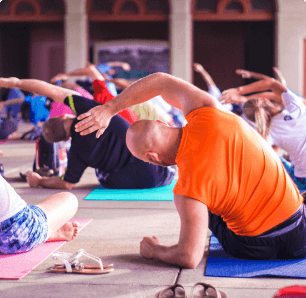Getting Well
One of the key goals of physiotherapy is to help you get well after injury or illness and return to a former level of comfort and function. New articles will be regularly added to this section to increase your awareness and knowledge. Come back and check often.
Keep excess weight off to improve your back and knees. Often overlooked is the positive impact weight loss can have on physical rehabilitation and recovery.
In This Section
BACK PROBLEMS
Common sense and scientific studies tell us that overweight and obese people have the greatest risk of back problems and the worst recovery rate.
KNEE PROBLEMS
A popular rule of thumb is that every kilo of weight loss is equivalent to four less kilos of pressure on a knee afflicted with joint osteoarthritis.
DRINK MORE WATER
Just about any important health-related goal is achievable in part by drinking more water.

ASK QUESTIONS FOR BETTER RESULTS
After setting up an appointment, what should you ask a physiotherapist upon first contact?
STOP SMOKING
Decades of data reveal an irrefutable fact: one in two smokers dies from tobacco use.
ROTATOR CUFF INJURY – TREATMENT OPTIONS
When the rotator cuff muscles become injured, certain everyday functions such as raising your arm above your head become difficult or impossible.
TO REST OR REHABILITATE
Pain, loss of energy, restricted movements will all want to stay between the covers, however whether you rest or rehabilitate will depend on a lot of factors.
TOTAL AND PARTIAL KNEE REPLACEMENTS
Osteoarthritis of the knee is a degenerative disease that wears out the cartilage of the knee, leading to pain, difficulty walking and deformity.
REST ALONE MAY NOT HEAL A SPRAINED ANKLE
A sprain will result in pain, swelling, stiffness and difficulty walking. The natural inclination is to rest the foot, but this alone is not always helpful.
FROZEN SHOULDER HOME PROGRAM TIPS
Frozen shoulder is a painful condition that can take months or even years to resolve. Therefore, after you are discharged from physiotherapy, you will be given a home exercise program to follow.
SPRAINED ANKLE AND ICE
Most people who sprain their ankle know of the RICE protocol; Rest, Ice, Compress, Elevate – and they apply it at the first sign of pain and swelling.
RUPTURED ACHILLES TENDON
Rupturing your Achilles tendon can be painful and disruptive to your lifestyle and worst of all, can linger for years.
REDUCING STRESS NATURALLY
By making certain lifestyle changes, stress can be brought under control and you can begin to enjoy life again.
MANAGEMENT OF NON-SPECIFIC BACK PAIN
Nonspecific back pain refers to pain in the back due to an unknown cause. This type of pain may be persistent and disabling and may or may not respond readily to over the counter drugs.
KNEE MANIPULATION
If after 2 to 4 weeks of post surgery rehab you cannot bend your knee to 90 degrees or straighten it, then you may require knee manipulation.
EXERCISING AFTER KNEE REPLACEMENT
Following a knee replacement, many people experience pain, discomfort as well as decreased range of motion. All of this makes the task of exercising very daunting.
HEALING SHOULDER IMPINGEMENT
The term shoulder impingement is used to describe the pinching feeling that results from the shoulder blade pressing against the rotator cuff – a group of muscles that work together to stabilise the shoulder joint.
PAIN MANAGEMENT
Pain can be managed effectively in a number of ways, but since chemical treatments are the most popular form of pain management, we often turn to those first.
GAIT ANALYSIS
Gait, sometimes called ambulation, is the way a person walks. Gait analysis is a detailed inspection of how a person walks.
RETURN TO EXERCISE AFTER HAVING A BABY
For the average woman, losing the fifteen or so kilos gained during pregnancy is strongly on her mind after giving birth.
OVERCOMING SHIN SPLINTS
The term “shin splints” refers to pain along the inner side of the shinbone or tibia. It is an injury that is seen frequently in runners.
POSTURE AND FROZEN SHOULDER EXERCISE
Frozen shoulder, as the name implies, is a painful condition in which the shoulder joint becomes “frozen”, making the smallest movement almost impossible.
ACL REHAB FOR ACTIVE ADULTS
One of the most common injuries among athletes is rupture of the Anterior Cruciate Ligament, one of the four main ligaments in the knee.
ROTATOR CUFF EXERCISES FOR REDUCING PAIN
When a rotator cuff injury occurs, it can be very painful and healing can be slow. Physiotherapy can help with exercises that strengthen the muscles and reduce pain.
PHYSIOTHERAPY EXERCISES FOR MUSCLE INJURIES
A simple injury can be treated with anti-inflammatory meds and rest, however a more serious type will require a doctor’s evaluation and physiotherapy.
CONTINUOUS PASSIVE MOTION (CPM)
A Continuous Passive Motion device is one that is used to maintain passive range of motion following a knee replacement, ACL reconstruction or surgery of the finger joints, shoulder, wrist and hand.
KNEE PAIN AND EXERCISE
The athlete who continues to exercise incorrectly with knee pain could be doing great harm. In serious cases, medical treatment may be necessary.
RICE: IMMEDIATE ACTION FOLLOWING AN INJURY
The first and best thing to do when an injury occurs is to apply the RICE formula; a treatment for reducing pain and swelling.
PREPARING FOR A KNEE REPLACEMENT
The thought of having a knee replacement is enough to make most people very nervous. With some advice from your physiotherapist and careful preparation, you can get over the procedure with very little discomfort.
PHYSIOTHERAPY FOR CHILDREN
Paediatrics is one of the more challenging but rewarding domains of physiotherapy. Therapists who work with children have the unique advantage of rehabilitating little bodies while having fun doing it.

